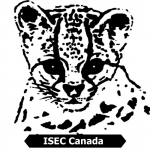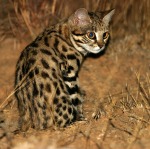 Our Mission: To aid in the conservation of small wild cat species through education, public awareness and support for scientific field projects.
Our Mission: To aid in the conservation of small wild cat species through education, public awareness and support for scientific field projects.
The International Society for Endangered Cats (ISEC) Canada was incorporated as a federally registered non-profit charity in 1990 in Calgary, Alberta. None of our directors or other personnel involved receive a salary – we are a totally volunteer organization. 100% of donations and all profits from memberships and product sales go directly to small wild cat conservation.
Our programs support the smallest wild cats, consisting of 40 species that weigh less than 50 lbs. We do not provide funding for the larger cats – tigers, lions, leopards, jaguars, snow leopards, cheetahs or cougar. Our main focus is providing funding for field research projects.
Why Fund Field Research Projects?
 Field research is the scientific study of the daily life of a species in their natural habitat. Where are the cats located? What kind of vegetation do they need? What do they eat? What time of day are they active? How many cats are there? What threats do they face?
Field research is the scientific study of the daily life of a species in their natural habitat. Where are the cats located? What kind of vegetation do they need? What do they eat? What time of day are they active? How many cats are there? What threats do they face?
Without all these answers, it is impossible to design an effective conservation plan. If we don’t know how large the population is, or where they like to live, suitable protected areas cannot be set up. Information is gathered with the use of radio collars, camera traps, box traps, scat and track surveys, and interviews with local people.
The small wild cats are thought to have no economic value, and thus are of little value to local people. People destroy the cats, either deliberately, through habitat alteration or removal of their prey species, because they are not worth anything.
For effective wild cat conservation, researchers must make cat populations more valuable to local residents and governments. Field studies identify areas where they live, and provide data on their ecology. Details on the small cats’ prey species, usually small rodents that are agricultural pests, help convince rural people that these little cats should be protected.
Please note: ISEC Canada does not hire any staff or volunteers for field projects. We support researchers around the world who have initiated their own projects, and hire their own staff and volunteers.
See our Projects Funded page for details on where your money goes.
Education and Public Awareness
- Established a members’ network around the world, and provide newsletters on the status of, and issues concerning, small wild cats
- Compiled and continue to maintain a Research Library with scientific and popular data
- Prepared Feline Facts, a booklet of fact sheets on all wild cat species, and Wild Cat Facts, a junior version of the same information. These books have been distributed to schools, libraries and conservationists around the world
- Published articles in newspapers and magazines, written a variety of informational brochures and booklets on wild cat conservation issues.
- Supplied books and information on conservation, ecology and wild cats to over 18 countries
- Created school programs for Grades one through six, dealing with the dangers facing wild cats
- Maintain a website, blog and a presence on all social media sites talking about small wild cats
- Provide the free online newsletter Wild Cat News
Support for Captive Breeding and Habitat Preservation
In past years, our programs supported certain captive breeding projects of the smallest or rarest small wild cat species. We also participated in habitat preservation programs so the cats would have safe habitat.
- SOS Care, a private breeding facility in southern California
- The Iberian Lynx El Acebuche Captive Breeding Centre in Spain
- The Clouded Leopard Project
- Land purchased in Costa Rica, Brazil, Cambodia and Canada
The International Society for Endangered Cats (ISEC) Canada is a registered non-profit charity under Canadian law. Charity Number 13308-8641-RR001
Pat Bumstead
Unfortunately, we are not able to fund any further projects for the near future, as we are already funding research on five cat species.
Lam norbu
I am from Bhutan, and have interest to do field research work on small cats, wild. But with no funding opportunity I couldn’t proceed further. In this regards would ask favor that do your organization support such grants to all international county? If they submit the project proposal.
The place where m working in Bhutan is having more than 5 small wild cat species but research on their ecology and conservation status are not carry out.
Pat Bumstead
As stated on our website, ISEC Canada does not initiate any research projects. We supply funding to various researchers who implement their own studies in various countries around the world.
Alex
How would one get involved in one of these projects? I’m going to college for wildlife next year and I would really like to study small wild cats.
Pat Bumstead
Please email your proposal to smallwildcats@gmail.com but be aware we only fund small wild cat projects, not those for any other wildlife.
Tashi
Kudos to the awesome conservation work.
how do we apply for a grant from ISEC to work on small cats?
Les Mitchell
I’m interested in this Soc. As soon as I get it sorted out, as regards money, I will donate